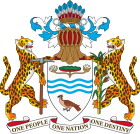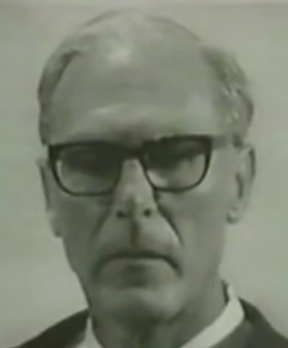 |
|---|
| Constitution |
The British Guiana Labour Party (BGCP) was a political party in British Guiana.
 |
|---|
| Constitution |
The British Guiana Labour Party (BGCP) was a political party in British Guiana.
The BGCP was formed in June 1946, with its leadership included Jung Bahadur Singh, J.A. Nicholson, Hubert Nathaniel Critchlow and Ashton Chase. [1] It contested 13 of the 14 seats in the 1947 elections, winning five of them and becoming the largest party in the Legislative Council. [1]
In 1949 Forbes Burnham became party leader, and the following year it merged with the Political Affairs Committee to form the People's Progressive Party. [2]
The history of Guyana begins about 35,000 years ago with the arrival of humans coming from Eurasia. These migrants became the Carib and Arawak tribes, who met Alonso de Ojeda's first expedition from Spain in 1499 at the Essequibo River. In the ensuing colonial era, Guyana's government was defined by the successive policies of Spanish, French, Dutch, and British settlers. During the colonial period, Guyana's economy was focused on plantation agriculture, which initially depended on slave labor. Guyana saw major slave rebellions in 1763 and 1823. Following the Slavery Abolition Act of 1833, 800,000 enslaved Africans in the Caribbean and South Africa were freed, resulting in plantations contracting indentured workers, mainly from India. Eventually, these Indians joined forces with Afro-Guyanese descendants of slaves to demand equal rights in government and society. After the Second World War, the British Empire pursued policy decolonization of its overseas territories, with independence granted to British Guiana on May 26, 1966. Following independence, Forbes Burnham of the rose to power, quickly becoming an authoritarian leader, pledging to bring socialism to Guyana. His power began to weaken following international attention brought to Guyana in wake of the Jonestown mass murder suicide in 1978.

British Guiana was a British colony, part of the mainland British West Indies, which resides on the northern coast of South America. Since 1966 it has been known as the independent nation of Guyana.

Cheddi Berret Jagan was a Guyanese politician and dentist who was first elected Chief Minister in 1953 and later Premier of British Guiana from 1961 to 1964. He later served as President of Guyana from 1992 to his death in 1997. In 1953, he became the first person of Indian descent to be a head of government outside of the Indian subcontinent.

The prime minister of the Co-operative Republic of Guyana is an elected member of the National Assembly of Guyana who is the principal assistant and advisor to the president as well as the leader of government business in the Assembly, but is not the head of government in Guyana. The prime minister assumes the office of president if the presidency becomes vacant.

Linden Forbes Sampson Burnham was a Guyanese politician and the leader of the Co-operative Republic of Guyana from 1964 until his death in 1985. He served as Premier of British Guiana from 1964 to 1966, Prime Minister of Guyana from 1964 to 1980 and then as the first Executive President of Guyana from 1980 to 1985. He is often regarded as a strongman who embraced his own version of socialism.

Elections in Guyana take place within the framework of a multi-party representative democracy and a presidential system. The National Assembly is directly elected, with the nominee of the party or alliance that receives the most votes becoming President.
The West Indies Federal Labour Party (WIFLP) or Federalists was one of two main Federal parties in the short-lived West Indies Federation, the other being the West Indies Democratic Labour Party (DLP) or Democrats. The party was the first national party of the planned West Indies Federation. In the 1958 West Indies federal elections, the party was victorious, winning 25 of the 45 seats in the Federal Parliament of the West Indies Federation.

The People's Progressive Party/Civic (PPP/C) is a major political party in Guyana. As of 2020, the party holds 33 of the 65 seats in the National Assembly and forms the government. It has been the ruling party in the past as well, most recently between 1992 and 2015. In Guyana's ethnically divided political landscape, the PPP/C is a multi-ethnic organization that is supported primarily by Indo-Guyanese people.
Eusi Kwayana, formerly Sydney King, is a Guyanese politician. A cabinet minister in the People's Progressive Party (PPP) government of 1953, he was detained by the British Army in 1954. Later he left the PPP to form ASCRIA, a Pan-Africanist grassroots political group that, after a brief flirtation with the People's National Congress (PNC) of Forbes Burnham, fused into the Working People's Alliance (WPA). Kwayana is also a playwright.
Sir Gordon James Lethem, KCMG was a British colonial administrator.

General elections were held in British Guiana on 12 August 1957. The result was a victory for the faction of the People's Progressive Party led by Cheddi Jagan, who remained Prime Minister.

The Guiana United Muslim Party (GUMP) was a Muslim political party in Guyana.

The Justice Party was an Indo-Guyanese political party in British Guiana.

General elections were held in British Guiana on 24 November 1947. The British Guiana Labour Party emerged as the largest party, winning five of the 14 seats. Voter turnout was 71%.

The Popular Party was a political party in British Guiana.

The National Democratic Party (NDP) was a political party in British Guiana led by Rudy Kendall.

The Manpower Citizens' Association was a trade union and political party in British Guiana.

The Political Affairs Committee (PAC) was a political party in British Guiana.

Peter Stanislaus D'Aguiar was a Guyanese-Portuguese businessman, conservative politician, and minister of finance from 1964 to 1967.